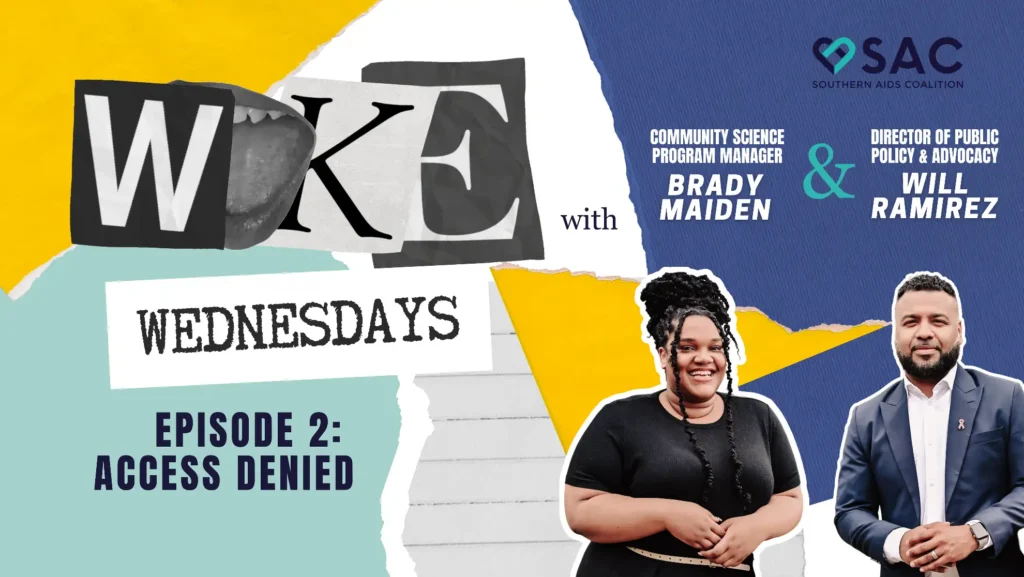“The movements for HIV and reproductive justice are intertwined, flowing directly into each other. True justice cannot be achieved without addressing both areas simultaneously and comprehensively.”
In honor of past awareness days this year, that have spotlighted women, girls, youth, and individuals of trans experience disproportionately impacted by HIV, it’s vitally important we address what does sexual health education look like when it is created with intention for these communities. Quality HIV and sexual health education is essential for empowering birthing people to take control of their own health and make informed decisions about their well-being. In the South, persistent challenges in this area have contributed to rising rates of new HIV diagnoses, restrictive reproductive and sexual health policies, and limited access to comprehensive sex education.
To address these barriers, quality sexual health education must be prioritized in the South, along with funding and policies that combat stigma and criminalization rather than perpetuate it. The region requires immediate attention and resources to improve the sexual health landscape for women, youth, and individuals of trans experience, who are being disproportionately impacted by HIV.
This brings us to a critical question: how can we end an epidemic when some of the largest groups directly affected cannot access the care they need? What then is needed to begin addressing the historical and present impacts that have created barriers to care for community. First, we must acknowledge the historical and present impacts that have created barriers in the South.
The South stands as the most restrictive region against abortion access in the nation. In 2022, Oklahoma passed the most restrictive law against abortion to date at the time, two months later Roe v. Wade was overturned. Despite passing the most restrictive law at the time, two years later, the Oklahoma legislature introduced a bill that would add additional barriers and would potentially create a database to track women who receive abortions in the state[1]. In early April of this year, the Arizona Supreme Court gave the state the opportunity to begin to enforce a near-total abortion law enacted during the Civil War. The law, enacted before Arizona became a state, provides no exceptions for rape or incest and allows abortions only if the mother’s life is at risk[2][3]. Luckily, due to push back from several stakeholders including supporters of other restrictive reproductive health policies, convinced Arizona legislators to repeal the antiquated abortion ban. On May 2nd, the bill made it to Governor Katie Hobbs desk, and she signed the law’s repeal.
The overturning of Roe v. Wade created a cascading effect on legislatures throughout the nation. Thirteen states implemented trigger laws that would be automatically enacted if Roe v. Wade was overturned[4]. Eight of those states were in the South, where restrictions to sexual and reproductive health have a deep-seated history, the overturning of Roe has created a landscape in which the region is strongly in favor of abortions. This climate of fear does not decrease the need for abortion and reproductive health services but increases the probability of birthing persons receiving retaliation for their choices and directly impacts them to potentially acquire STIs and improper care.[5] [6]
Abortion bans have the potential to impact the health and safety of over 64 million birthing persons in the US. People living with HIV face potential disproportional harm from these bans, furthering the wide gap in health disparities that already exist within this population[7].
The long-term effects of the overturning of Roe v. Wade are becoming increasingly apparent. There is still an increasing need for abortion and reproductive services, and the reversal of the law has heightened stigma and criminalization for women, girls, nonbinary and transmasculine individuals. Everyone deserves the ability to make their own decisions about their health, but a climate of fear has emerged, causing individuals to hesitate to seek the care they need due to the threat of retaliation.
Not only do we continue to see barriers to education, but birthing people are being met with obstacles when trying to receive health coverage for reproductive care.
Currently, the largest source of federal funding for family planning services that exists in this country is Medicaid. 4 in 10 births in the United States as well as prenatal and postpartum care are financed by Medicaid.[8] Federal law requires states to provide coverage to pregnant individuals if they meet the federal poverty line thresholds, but states differ on prenatal and postpartum coverage they offer. Like coverage for pregnant people, states differ on their contribution to abortion care. Typically, only matching funds for abortions for pregnancies caused by rape or incest. These differences present a jumbled national landscape.
Additional federal funding for family planning programs includes Title X of the Public Health Service Act and federal block grants. Together, all three, encompass the federal funding contribution for family planning for low-income individuals in the United States. These subsidies differ considerably by state as their policymakers decide on how to and at what capacity, fund their family planning efforts. These programs have faced an extreme number of attacks in Southern States over the past decade. The recent appropriations fight highlighted those attacks as Title X (Title 9) was put on the chopping block to eliminate all its funding. These sorts of draconian measures are set to continue as the dissemination of social conservative strategies like Project 2025 by the Heritage Foundation continue to gain traction within the wider conservative movement.
To make sure there is a continuance in the dialogue on expanding access to care for birthing individuals in the South, there needs to be action on multiple fronts. Some recommendations are:
Increasing PrEP Access and Awareness: Data reveals low PrEP usage among birthing persons. Healthcare providers must offer comprehensive inclusive training programs to enhance understanding and uptake.
Routine HIV Testing: OBGYNs should integrate HIV testing into routine gynecology visits, ensuring early detection and intervention.
Addressing Structural Inequities: Government agencies must confront structural inequities rooted in gender, race, class, and other factors to eliminate barriers to care within birthing communities.
Legislative Advocacy: Despite existing marginalizing legislation, we need stronger and continuous advocacy efforts to expand access to care for birthing persons.
Provider Commitment: Clinicians and healthcare providers should develop policies and increase awareness training to foster stronger patient-provider experiences.
We must amplify existing care resources and learn from community-based organizations with extensive experience in this field. By prioritizing training, awareness, and patient-centered advocacy around reproductive and sexual health, we advance not only towards ending the HIV epidemic but also honing in on a health equity focus for all marginalized groups. Sexual health education and resources should no longer rely solely on elders passing down knowledge. Policymakers must prioritize expanding resources and establishing infrastructures that ensure the availability and continuation of care and education representative of all birthing communities being impacted. Empowering individuals to take control of their health requires not only agency but also the resources to make informed decisions.
Those giving birth need more options and stronger access to the care they require. The movements for HIV and reproductive justice are intertwined, flowing directly into each other. True justice cannot be achieved without addressing both areas simultaneously and comprehensively.
References
[1] Forman, C. (2024, February 15). New Oklahoma Bill could allow state to create database of women who had abortions. The Oklahoman. https://www.oklahoman.com/story/news/2024/02/15/oklahoma-abortion-law-kevin-west-bill-creates-database-women/72613836007/
[2] Billeaud, J., & Lee, M. (2024, April 10). What to know about abortion in Arizona under the near-total 1864 ban. AP News. https://apnews.com/article/arizona-abortion-ban-what-to-know-797a4bbbc738497fe2284d6870c5be24
[3] Forman, C. (2024a, February 15). New Oklahoma Bill could allow state to create database of women who had abortions. The Oklahoman. https://www.oklahoman.com/story/news/2024/02/15/oklahoma-abortion-law-kevin-west-bill-creates-database-women/72613836007/
[4] Nash, E., Guttmacher Institute, & Guarnieri, I. (2023, July 18). 13 states have abortion trigger bans-here’s what happens when Roe is overturned. Guttmacher Institute. https://www.guttmacher.org/article/2022/06/13-states-have-abortion-trigger-bans-heres-what-happens-when-roe-overturned
[5] Abortion laws by State. Center for Reproductive Rights. (2024, May 1). https://reproductiverights.org/maps/abortion-laws-by-state/
[6] Forman, C. (2024a, February 15). New Oklahoma Bill could allow state to create database of women who had abortions. The Oklahoman. https://www.oklahoman.com/story/news/2024/02/15/oklahoma-abortion-law-kevin-west-bill-creates-database-women/72613836007/
[7] Clin Infect Dis. 2023 Jan 1; 76(1): 152–154.
Published online 2022 Sep 5. doi: 10.1093/cid/ciac721
[8] Madeline Guth and Karen (2023, June 29). What does the recent literature say about Medicaid expansion?: Impacts on sexual and Reproductive Health. KFF. https://www.kff.org/medicaid/issue-brief/what-does-the-recent-literature-say-about-medicaid-expansion-impacts-on-sexual-and-reproductive-health/

